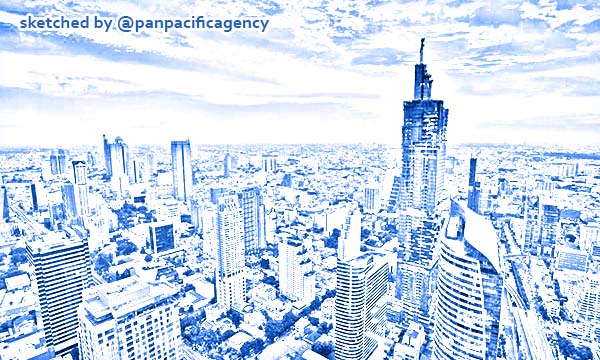[Analytics] ASEAN masses behind China as it pushes world’s biggest free trade pact

Bangkok is the setting for the ongoing ASEAN summit. iStock. Sketched by the Pan Pacific Agency.
Southeast Asian leaders look determined to make progress on the world’s largest commercial pact, the China-led Regional Comprehensive Economic Partnership during the two-day Association of Southeast Asian Nations summit which gets underway in Bangkok, Thailand, on Saturday. Andrew Salmon, AFP specially for the Asia Times.
The RCEP encompasses all 10 ASEAN economies, plus India, Japan, South Korea, Australia and New Zealand. It is widely seen as a mechanism for China to draft the rules of Asia-Pacific trade, following what many believe will be an eventual US retreat from the region.
Forward movement on RCEP at the ASEAN summit would be a boon for a Beijing that is engaged in an increasingly bruising trade war with Washington. The cross-Pacific barrages are also causing collateral impact on regional economies, whose supply chains are closely inter-twined with China’s.
In fact, the timing of the ASEAN summit could not be better for Chinese President Xi Jinping, who is expected to meet US President Donald Trump at the G20 summit in Osaka, Japan, next weekend.
Xi has just returned from a two-day state visit to North Korean leader Kim Jong Un in Pyongyang. Virtually no substantive information has leaked out of that visit, indicating that Xi was garnering talking points and possible solutions to offer Trump, who is almost certainly keen to be appraised of Kim’s latest views on denuclearization.
That, together with momentum on RCEP at ASEAN, could offer Xi some negotiating leverage with Trump in Osaka, where the two are expected to discuss their tariff war.
Other issues set to be discussed at by ASEAN leaders at the summit, which is being chaired by Thailand, include disputes in the tense South China Sea, Myanmar’s persecution of Rohingya Muslims and maritime plastic pollution.
China pushes trade panacea; ASEAN responds
ASEAN leaders appear keen to hasten the signing of the China-drafted RCEP.
Shortly after his election, Trump pulled the US from a competing free-trade deal, the Trans-Pacific Partnership (TPP) — which would have been the world’s largest trade deal — slamming it as an American “job killer.” Tokyo has since taken up the slack, promoting the TPP regionally and globally, and there are hopes that Washington may rejoin.
In the meantime, Beijing is pushing hard on RCEP.
While tit-for-tat tariffs between the world’s biggest two economies have seen some manufacturers flee China to safer competitors such as Vietnam, economists say the big picture for global growth is bleak. That outlook that will impact ASEAN.
In that context, “RCEP is key to increasing trade volume,” Thai government spokesman Werachon Sukhondhapatipak told reporters.
“The faster it gets implemented the better,” Martin M. Andanar, Philippines Communications Secretary, told reporters. “Free trade is definitely what we need here in this region.”
He added that the US-China trade row has resulted in “the entire world catching a cold.”
Still, all is not plain sailing; progress on the deal has stuttered in recent months. India fears cheap Chinese goods could flood its massive consumer market, while Australia and New Zealand have raised concerns over RCEP’s lack of labor and environmental safeguards.
Serious horse trading is anticipated later in the year, when trade envoys from all of the potential signatory countries assemble, but the deal is expected to win some tailwinds in Bangkok.
Rohingya rights and rubbish
Trade is not the only item on the agenda for ASEAN leaders.
Malaysian leader Mahathir Mohamad on Friday raised the prospect of a joust with Myanmar over the Rohingya, the Muslim minority driven in massive numbers into Bangladesh by waves of concussive violence. “We hope something can be done to stop the oppression,” he said.
Myanmar’s Aung San Suu Kyi will attend the summit.
ASEAN is also set to agree on a statement to “prevent and significantly reduce” marine debris, including plastic, across the region, according to a draft text seen by AFP.